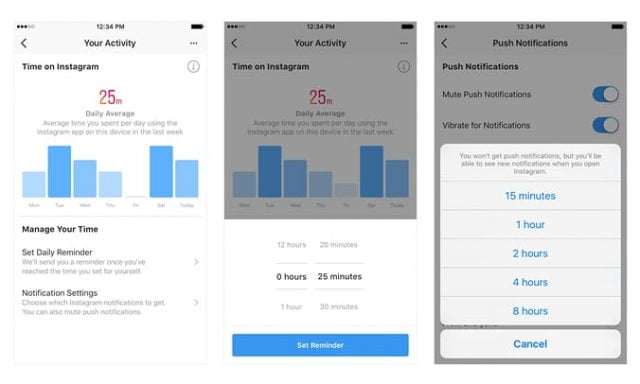If you are relentlessly worried about the indefinite time you spend scrolling through your friend’s pictures on Facebook or scouring through the feed on Instagram, you can look to “time well-spent” on social media sites.
I must be kidding, right? Well, that seems just like a bait to balance the corporate interest of spending more time on Facebook or Instagram while trying to be responsible towards continual alert messages or notifications about the time wasted on social media sites.
Tools Making Sure Of Time Well-Spent
Intending to facilitate a key user experience citing self-control over the usage of apps, this is what Facebook’s David Ginsberg and Instagram’s Ameet Ranadive addressed in a former blog post,
“We developed these tools based on collaboration and inspiration from leading mental health experts and organizations, academics, our own extensive research and feedback from our community.
“We want the time people spend on Facebook and Instagram to be intentional, positive and inspiring. Our hope is that these tools give people more control over the time they spend on our platforms and also foster conversations between parents and teens about the online habits that are right for them.”
The tools will be available under headers “Your time on Facebook” and “Your activity” on Facebook and Instagram respectively.
Users can consult trackers under the settings which display the average amount of time they spend on their respective applications.
In addition to that, both the platforms will also have “Mute Notifications” in order to suspend Fear-of-missing-out induced alerts for minutes or hours.

Is This New Feature Going To Change The Way People Talk About Facebook or Instagram?
Facebook acknowledged in a blog post the negative impacts of spending too much time on social media.
In fact, an experiment was conducted on students in the University of Michigan where students scrolling through Facebook for more than 10 minutes were found to be in a worse mood by the end of the day than the students talking or chatting up with friends on the site.
In a bid to improve the experience of users, this is a move to taking responsibility towards talking openly about how online media impacts people.
Facebook has endured major scandals lurking on the social media platform ranging from election security, hate speech, and infringement of privacy.

You Can Also Read: Demystified: Does Radiation From Rooftop Mobile Towers Really Cause Cancer?
Although this time-limiting model is counterproductive to Facebook’s only medium of earning money which is through the selling of advertisements, Mark Zuckerberg has emphasized his top priority to be the well-being of users.
There have been consistent efforts towards assuring that the time spent by users on social media is valuable. In January 2017, Zuckerberg announced about a shift in the Facebook content focusing more on details about family and friends than brands and publishers.
There is the “Snooze” feature which enables users to choose not to see posts from a certain person for 30 days without unfriending them.
Similar to the “Snooze” feature, Instagram also shows up a “You Are All Caught Up” message when the user has been scrolling through the posts added by the people they follow in the last 48 hours.
Although I think being aware of spending too much time on social media along with reminder notifications could give me a kick to stop using my phone for a while, relying solely on Apple of Facebook to fix the situation entirely won’t change anything unless I choose to take my own responsibility.
Apart from such efforts leaning towards a positive self-control, there are serious issues at hand which these media giants need to talk about.
There are issues like the need for mandatory child safety codes supervised by an independent regulator to crack down on perpetrators not attaining to such standards.
On the contrary, these tools would rather benefit Facebook by helping them retain users for a longer period of time subsequently improving upon the worsening mental health situation a lot of people have been exposed to for reasons attributed to social media addiction.
Sources: BBC, The Guardian, TIME
Image Credits: Google Images
More Recommendations:
Why Is The Centre Blaming WhatsApp For Fake Rumours And Not BJP IT Cell?

































